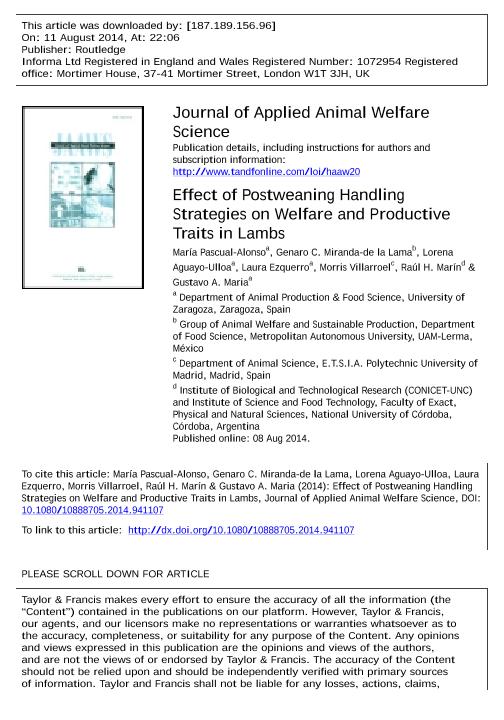Mostrar el registro sencillo del ítem
dc.contributor.author
Pascual-Alonso, María
dc.contributor.author
Miranda-de la Lama, Genaro C.
dc.contributor.author
Aguayo-Ulloa, Lorena
dc.contributor.author
Ezquerro, Laura
dc.contributor.author
Villarroel, Morris
dc.contributor.author
Marin, Raul Hector

dc.contributor.author
Maria, Gustavo A.
dc.date.available
2019-05-20T15:41:50Z
dc.date.issued
2015-01
dc.identifier.citation
Pascual-Alonso, María; Miranda-de la Lama, Genaro C.; Aguayo-Ulloa, Lorena; Ezquerro, Laura; Villarroel, Morris; et al.; Effect of post-weaning handling strategies on welfare and productive traits in lambs; Routledge Journals, Taylor & Francis Ltd; Journal Of Applied Animal Welfare Science; 18; 1; 1-2015; 42-56
dc.identifier.issn
1088-8705
dc.identifier.uri
http://hdl.handle.net/11336/76711
dc.description.abstract
Postweaning management strategies that include an element of social enrichment may reduce weaning stress and improve welfare and productive performance. We analyzed the effect of postweaning handling strategies on welfare and production traits in lambs. After weaning, 36 lambs were assigned to 3 experimental groups with 12 lambs each (control [C], fattening with gentle human female contact [H], and fattening with 2 adult ewes [E]). The average daily gain (ADG) was estimated. Blood samples were taken, and infrared thermography was used to estimate stress variables. There were significant differences among treatments (in favor of alternative strategies) regarding production and stress variables (cortisol, glucose, and creatine kinase). The results suggest that the lambs handled gently during the fattening were less reactive and better able to modulate their physiological stress. The E group adapted better to acute stress than the C group but was less efficient in modulating chronic stress. Both treatments showed higher slaughter live weights and better ADGs compared with the control. The use of social enrichment at weaning, especially to establish a positive human–nonhuman animal bond, alleviates lamb weaning stress and improves welfare and performance.
dc.format
application/pdf
dc.language.iso
eng
dc.publisher
Routledge Journals, Taylor & Francis Ltd

dc.rights
info:eu-repo/semantics/openAccess
dc.rights.uri
https://creativecommons.org/licenses/by-nc-sa/2.5/ar/
dc.subject
Ewe Nurse
dc.subject
Gentle Human Contact
dc.subject
Lambs
dc.subject
Postweaning Handling Strategies
dc.subject
Welfare
dc.subject.classification
Otras Ciencias Veterinarias

dc.subject.classification
Ciencias Veterinarias

dc.subject.classification
CIENCIAS AGRÍCOLAS

dc.title
Effect of post-weaning handling strategies on welfare and productive traits in lambs
dc.type
info:eu-repo/semantics/article
dc.type
info:ar-repo/semantics/artículo
dc.type
info:eu-repo/semantics/publishedVersion
dc.date.updated
2019-05-14T21:35:48Z
dc.identifier.eissn
1532-7604
dc.journal.volume
18
dc.journal.number
1
dc.journal.pagination
42-56
dc.journal.pais
Reino Unido

dc.journal.ciudad
Londres
dc.description.fil
Fil: Pascual-Alonso, María. Universidad de Zaragoza; España
dc.description.fil
Fil: Miranda-de la Lama, Genaro C.. Universidad Autónoma Metropolitana; México
dc.description.fil
Fil: Aguayo-Ulloa, Lorena. Universidad de Zaragoza; España
dc.description.fil
Fil: Ezquerro, Laura. Universidad de Zaragoza; España
dc.description.fil
Fil: Villarroel, Morris. Universidad Politécnica de Madrid; España
dc.description.fil
Fil: Marin, Raul Hector. Consejo Nacional de Investigaciones Científicas y Técnicas. Centro Científico Tecnológico Conicet - Córdoba. Instituto de Investigaciones Biológicas y Tecnológicas. Universidad Nacional de Córdoba. Facultad de Ciencias Exactas, Físicas y Naturales. Instituto de Investigaciones Biológicas y Tecnológicas; Argentina. Universidad de Zaragoza; España
dc.description.fil
Fil: Maria, Gustavo A.. Universidad de Zaragoza; España
dc.journal.title
Journal Of Applied Animal Welfare Science

dc.relation.alternativeid
info:eu-repo/semantics/altIdentifier/url/https://www.ncbi.nlm.nih.gov/pubmed/25105466
dc.relation.alternativeid
info:eu-repo/semantics/altIdentifier/doi/http://dx.doi.org/10.1080/10888705.2014.941107
Archivos asociados
